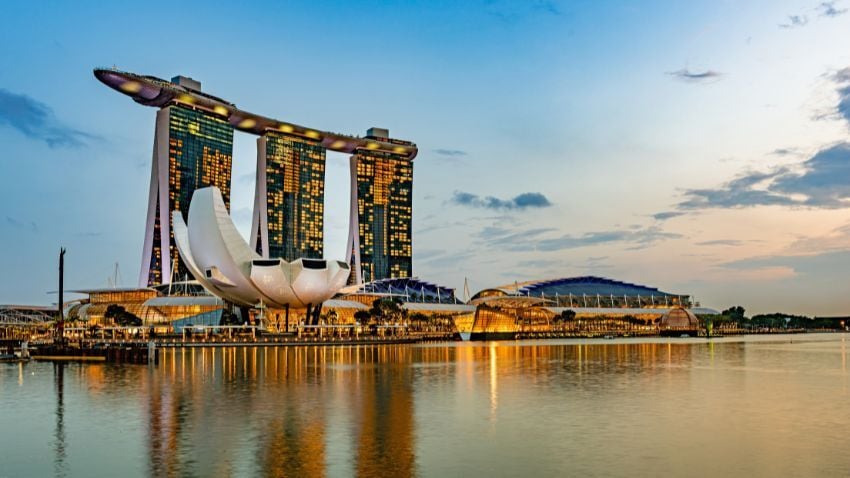How Safe Is Japan?
The word "Japan" brings to mind many things: high-tech, sushi, anime, samurai, and cherry blossoms. It is one of the most intriguing countries in...

5 min read
Medical professionals spend a great deal of time learning their craft, jumping through academic hoops, and dealing with endless bureaucracy. The path is indeed complex, from strict medical school programs and national exams to complying with multiple state and federal regulations. However, even for medical professionals with decades of experience and business success, a single malpractice lawsuit could jeopardize everything they worked so hard for.
After building a successful career and reputation, imagine facing a lawsuit your insurance barely covers. You are liable to pay millions from your own pocket. Such scenarios may sound like horror stories, but they are real-life nightmares experienced by many medical professionals. Traditional asset protection strategies, such as domestic trusts, foundations or bank savings, don’t cut it in today’s litigious world.
In this article, I discuss a powerful alternative that has helped many healthcare professionals protect their assets: offshore trusts and foundations. Read on to discover how these tools can help you secure what’s rightfully yours and keep your financial future under control.

To protect your assets, I strongly recommend creating an offshore trust or foundation. These are powerful tools for tax optimization and also provide an extra layer of privacy
Medical malpractice lawsuits pose a significant concern for the healthcare sector in the United States. About half of all U.S. physicians have faced litigation for malpractice, with approximately 85% of OBGYNs (Obstetrics/Gynecology) experiencing lawsuits twice. The typical settlement amounts outside of court average around $250,000 USD, while jury awards can reach around $1 million USD per case—if not more.
Healthcare professionals, especially surgeons and OBGYNs, can lose all they worked so hard for. Moreover, insurance companies and conventional financial and tax advisors suggest asset protection methods that simply don’t work anymore; your domestic trust or foundation is still within the reach of your home country’s government.
Because of these types of situations, I cannot emphasize enough how important it is to do your due diligence and read the fine print. Your insurance company can let you down once your case gets a little out of hand. So what could you do now?
Winning a court case in litigious countries like the US might be difficult, even if you did nothing wrong. Keeping all of your transactions within your country’s borders facilitates tracking and exposure by government agencies and courts, who can more easily access your banking information and, of course, your assets, as your bank or credit union is often required to report certain transactions (in the US, those over $10,000 USD).
Imagine getting your account frozen or losing the house you’ve been paying for years. There must be a way to protect what you worked so hard for.
When protecting your assets, I typically recommend setting up an offshore trust of the foundation. These tools are often used for tax optimization, but they offer an extra perk: privacy.
If you find yourself facing a medical malpractice suit and are ordered to make payments, having money in your offshore trust fund can help protect your assets. Even if a judge issues a judgment or a jury awards a settlement, your offshore assets are more secure because they're beyond your home country's jurisdiction. This means that while you might have a legal obligation to pay, your offshore trust or foundation can safeguard your assets from being directly seized.
Think of privacy as your secret weapon when you’re being sued. Offshore trusts and foundations are governed by strict privacy rules and often reject foreign court orders, providing an additional layer of protection for your assets.

Jersey and Guernsey are well-known for their strong rule of law and stable politics. These small islands have regulatory frameworks designed to protect your wealth
Going offshore might seem risky, especially if you opt for non-English-speaking countries; in such jurisdictions, it is strongly advisable to hire qualified professionals, such as trustees, directors, and lawyers. When you surround yourself with the right people, you can enjoy the benefits of offshore asset protection vehicles:
Many offshore jurisdictions boast legal frameworks specifically designed to protect foreign assets. Some examples include the Cook Islands, Nevis, and Belize for their solid protection against creditors and foreign court orders. In other words, trusts and foundations in these jurisdictions rarely recognize foreign claims.
Jurisdictions like Jersey and Guernsey have a long tradition of strong rule of law and political stability. For example, these small UK Crown dependencies maintain a regulatory framework designed to protect your wealth.

With Expat Money, one of our main focuses is offshore wealth protection. We excel at this by listening to you and ensuring we fully understand your unique situation. This is vital because each individual is unique and requires a customized approach
As a seasoned expat consultant with over a decade of experience, I reckon that going offshore is the best option to protect your hard-earned money. The world is getting crazier every day, not just because of high taxes but also due to an evident attack on privacy. If you limit yourself to conventional asset protection methods, such as domestic trusts and foundations, you are not really shielded.
The good news is that there is still a handful of jurisdictions where you can place your money and assets, ensuring they are out of the reach of your home country’s government. What’s more, since said assets won’t be under your name, you get an extra layer of privacy. When court orders try to rip you off and seize your assets, you can assert you own (pretty much) nothing.
At Expat Money, offshore wealth protection is one of our main strengths. How will we work with you? First, we listen to you, making sure we understand the details of your particular situation. This is important because there is no one-size-fits-all approach to asset protection and privacy. Even though trusts and foundations have many similarities, they also have differences. Therefore, your case needs to be thoroughly studied.
After analyzing your unique needs and goals, it’s time for a tailored strategy. Note that we do NOT use a cookie-cutter approach. What works for others might not work for you, and vice versa. We leverage our expertise in the field, along with a vast network of legal professionals, to set up a structure that maximizes your protection and benefits. Here, we also choose the right jurisdiction for you in terms of political stability and privacy laws.
Time to get started and handle all aspects of implementation, including setting up the trust or foundation, transferring assets, and ensuring compliance with all relevant laws and regulations. Our team works closely with local attorneys and trustees to ensure that your asset protection structure is effective and compliant.
Asset protection is a continual process that requires refinement and, in some cases, changes down the road. Luckily, most offshore trusts and foundations allow you to modify aspects such as beneficiaries, the board of directors, and asset distribution policies. Also, it is important that your structure always complies with new laws and stays robust against threats.

Offshore trusts and foundations offer attractive alternatives by providing greater privacy, robust protection against legal claims, tax minimization benefits, and estate planning advantages, ensuring the preservation of your legacy
In conclusion, medical professionals increasingly need robust asset protection strategies, given the likelihood of malpractice lawsuits and the limitations of domestic legal frameworks. Offshore trusts and foundations present compelling alternatives, offering enhanced privacy and robust protection against legal claims. These structures not only safeguard your assets but also provide tax minimization and estate planning benefits, ensuring the preservation of your legacy. Considering the complexities and high stakes, it's essential for medical professionals to explore their asset protection options actively.
Why not take a moment to evaluate how an offshore trust or foundation could fortify your family's financial future and your own? If you want to go the extra mile and protect your assets effectively and legally, read this important letter and fill out the form below. Do not let anyone take what’s rightfully yours.
If you want the best intel from the expat world, including profitable offshore opportunities, little-known tax-saving strategies, and hard-won insights on immigration, passports, and Plan-B residencies, all delivered to your inbox every single week, then join our daily correspondence, EMS Pulse®. Currently enjoyed by over 84,000 expats and expat-hopefuls worldwide. Fill in the form below to join our newsletter free:

Written by Mikkel Thorup
Mikkel Thorup is the world’s most sought-after expat consultant. He focuses on helping high-net-worth private clients to legally mitigate tax liabilities, obtain a second residency and citizenship, and assemble a portfolio of foreign investments including international real estate, timber plantations, agricultural land and other hard-money tangible assets. Mikkel is the Founder and CEO at Expat Money®, a private consulting firm started in 2017. He hosts the popular weekly podcast, the Expat Money Show, and wrote the definitive #1-Best Selling book Expat Secrets - How To Pay Zero Taxes, Live Overseas And Make Giant Piles Of Money, and his second book: Expats Guide On Moving To Mexico.

The word "Japan" brings to mind many things: high-tech, sushi, anime, samurai, and cherry blossoms. It is one of the most intriguing countries in...

Singapore is often described as a city that works, and it totally deserves its reputation. This small island nation in Southeast Asia has built one...

Panama’s geographic size is modest, but its global relevance is not. The country connects two oceans and two continents, operates on a dollarized...